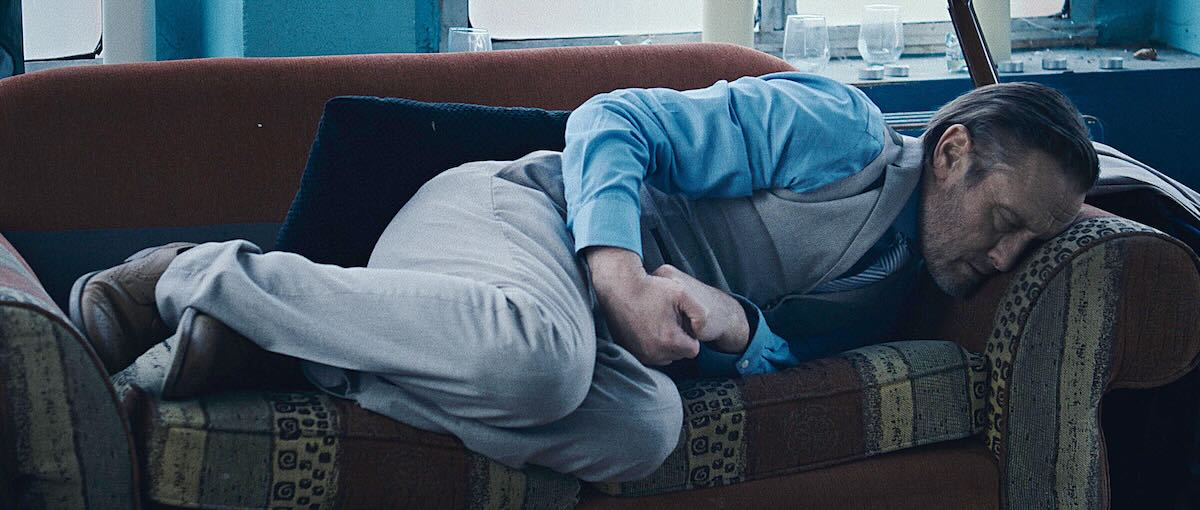
We open in the mean streets in Ireland, skinheads slugging, snorting and swaggering, "fook" this and "fook" that. Finding pride in their doomed lives.
Familiar territory, a genre onto itself. But you'll be unprepared for the gut punch that’s eventually served up in John Connors' blunt and brutal film, The Black Guelph.
The film opens on a crew of punks in a sea of backyard laundry lines, up to no good. One of them, Canto, sees you, and breaks the fourth wall, gets right in your fookin' face. "What'd'ya want?" he demands. He knows why you're here and he's got it all. We’ll follow his story first.
Canto arrives home to the projects to find his stuff in black garbage bags left outside his flat. He bellows for “Leah!” He swears and threatens and hammers the door. If she’s inside she won’t let him in.
Canto, now homeless, gets a new place from the big boss Ryan, the better to keep this bad boy under his thumb. This way, Ryan keeps feeding Canto's addiction and extending his yards of bad debt.
So Canto settles in, huffin' and puffin', making his deals. Soon he's begging Leah to let him come back home to her and his little daughter.
And that's when Dad comes to town.
Canto's father, Dan, is an artistic type, guitar slung over his shoulder, paintings he's done crammed into his bag. Dan sets up in an abandoned industrial space, empty save for a moldy couch. There he encounters a shy introvert named Virgil, a gentle soul who cares for his mother, herself a recovering junkie. Before he even sees Canto and has the chance to let him know he's back, Dan's acquired a surrogate son.
Director John Connors spins a fine web of relationships, creating a misfit community. His shooting style is naturalistic, handheld, (read: "low budget") and much of the acting is improvised.
Take Canto. As played by Graham Earley, he's all drug buzz and adrenaline with nowhere to go. His trajectory is one that anybody acquainted with a junkie will know well: a steady stream of promises and disappointments.
Dan the father (Paul Roe) stays on the edges at first, an eye of the storm, until his own inner demons become clear. As a child his trust was betrayed by a priest, and he's been addicted and wandering ever since. The depth of Dan’s tragedy turns The Black Guelph into a meditation on generations and why some fathers inflict damage upon sons.
Director/writer John Connors has acted in Irish TV, is a playwright and activist. He is also a member of the Irish Traveller community (Minceir), Ireland’s only indigenous ethnic minority. He uses the gangsta genre to the best advantage to tell his tale. Additionally, he plays Ryan, the local kingpin, with confident menace.
As verité as his film might appear, Mr. Connors' direction is surehanded. His script (cowritten with Tiernan Williams) plants plot points like landmines. Cinematographer Carl Quinn's camera is as nerved up as the characters. It jolts and careens, close enough sometimes to see pores, then stands back for a breath in wide shots. The film's subtle editing design (credited to Tiernan Williams) connects events past and present, most startling the intercutting between a spoon bubbling with heroin and the bestowal of the holy Eucharist.
Mr. Connors' has a keen eye: A shot of Virgil tucking in Beatrice, his addicted mom, has a holy glow about it. At a pivotal juncture, Dan and Beatrice stand both in their best clothes amongst urban squalor.
The cast is uniformly excellent. Besides Mr. Earley and Mr. Roe, Denise McCormack brings real pathos to Beatrice, and the codependent spiral she's in with her earnest son Virgil, played achingly by Tony Doyle. Lauren Larkin is Canto's long suffering baby mother, Leah. Kevin Glynn as Father Peter and Barry John Kinsella as the State Barrister are convincing studies in cruel power. Casey Walsh and Dean "Dubzeno" Murphy are Canto's buds and partners in crime, one brash the other quietly calculating.
What exactly is the Black Guelph? The movie won't tell you but look it up. The history dates back to 1300 AD and is devastating.
Given its genre, The Black Guelph has surprisingly little bloodletting. The violence is emotional, baked into aimless lives that crash together. While heartbreaking and harrowing, the film doesn't bask in carnage, and it offers something like an explanation of how, in John Connors' words, "unresolved trauma permeates through generations and flows deep within the psyche."
_____________________________________________________
The Black Guelph. Directed by John Connors. 2022. Produced by Cluster Fox Films. 120 minutes. On VOD and in theaters.
